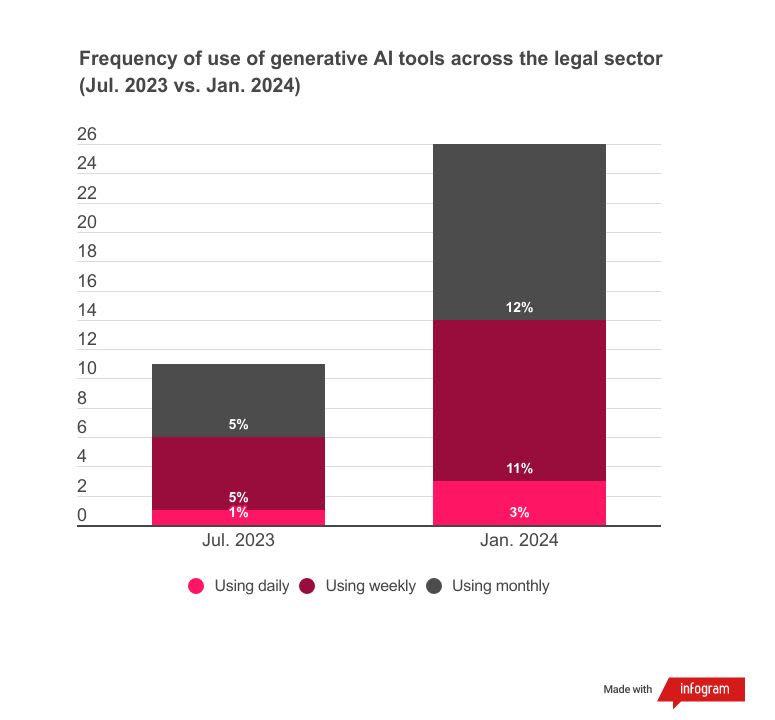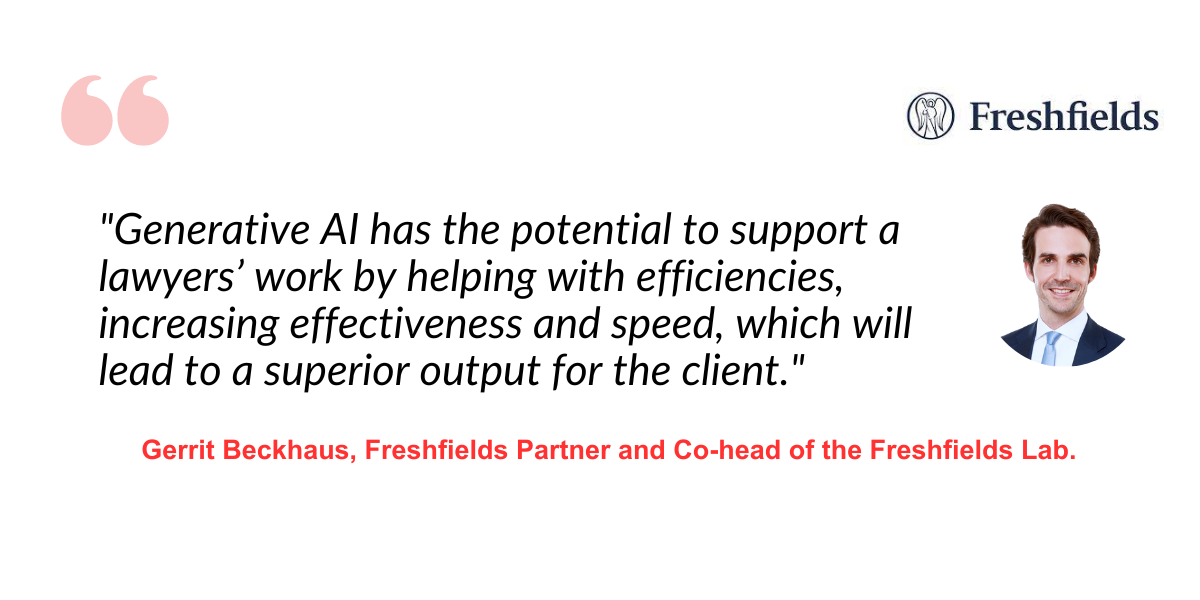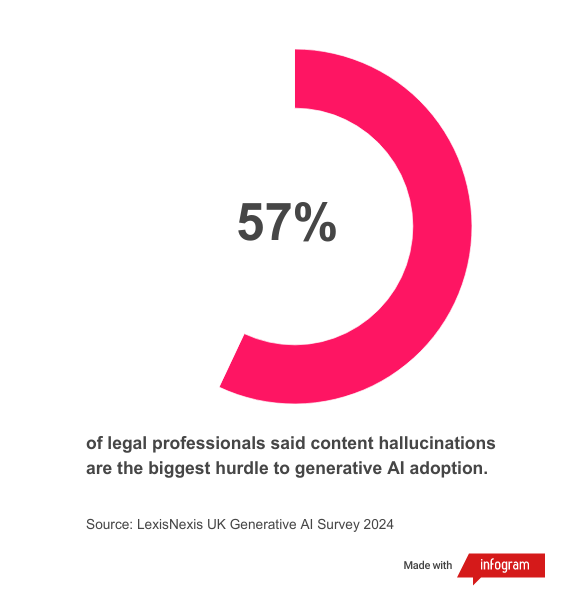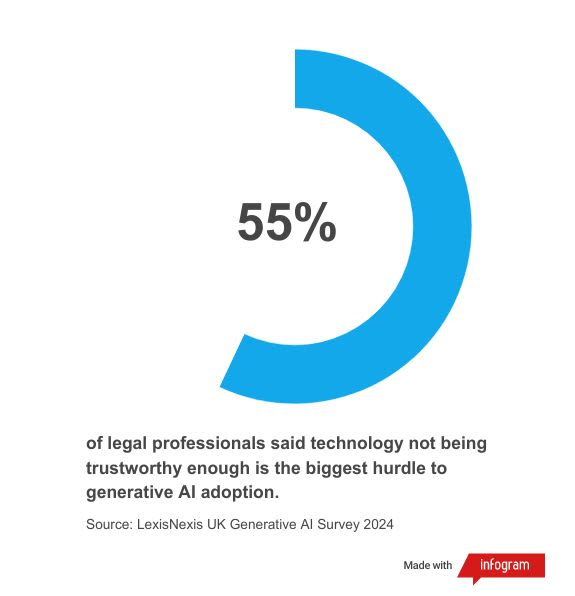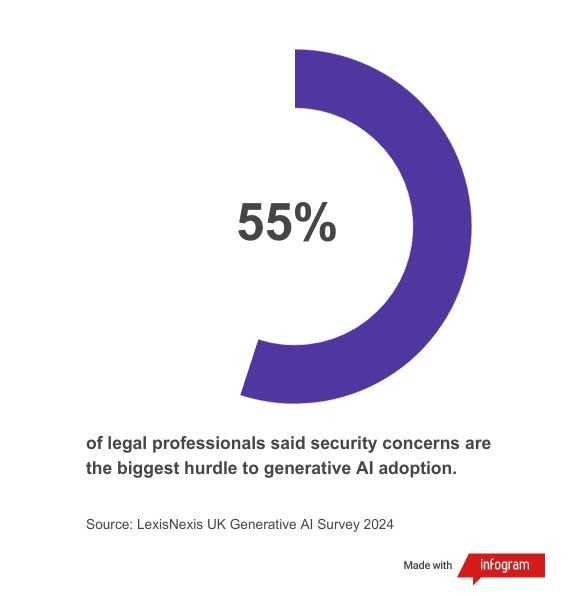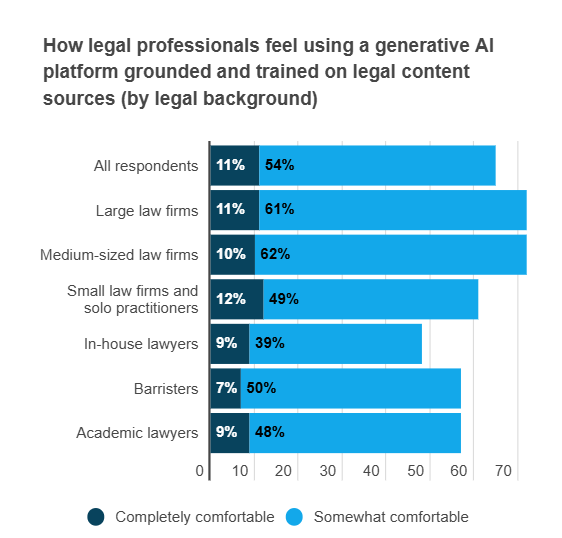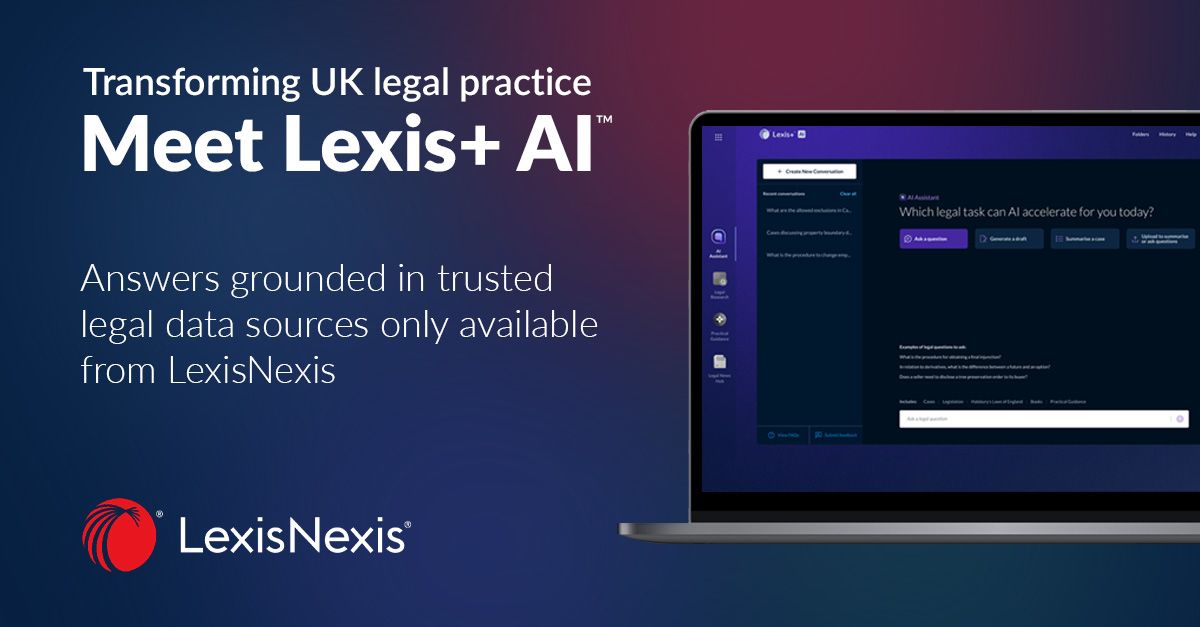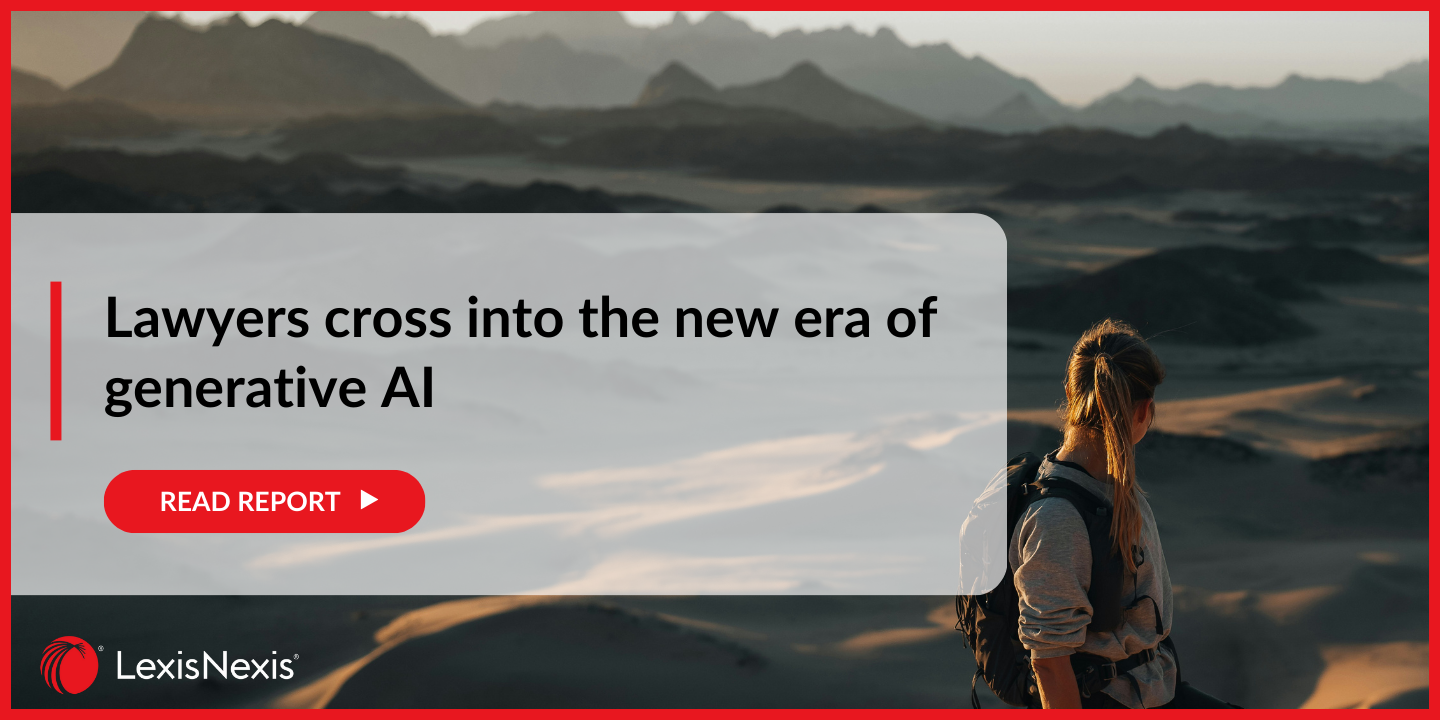Lawyers' biggest barriers to AI adoption
The biggest barriers. The best solutions. A must-read analysis of generative AI for the legal profession.

In the last six months alone, generative AI adoption rates have more than doubled.
Yet concerns still linger over the inaccuracies of free-to-use generative AI tools. For lawyers to get the most of this rapidly growing technology, they want tools grounded in trustworthy legal sources.
Generative AI adoption accelerates
The appetite for generative AI technology in the legal sector is unprecedented, with lawyers from all backgrounds jumping at the chance to make the most of its time-saving potential.
In January 2024, LexisNexis surveyed more than 1,200 legal professionals in the UK on their use of generative AI. A little over a quarter (26%) of respondents revealed they're using generative AI tools at least once a month. This is a noticeable rise from only 11% of respondents in July 2023.
A quarter (26%) of legal professionals are using generative AI at least once a month.
Respondents from academic institutions and large law firms were the most likely to use these tools for their work, at 33% and 32% respectively.
Generative AI will fundamentally change the way we work in the legal industry, says Dr. Gerrit Beckhaus, Freshfields Partner and Co-head of the Freshfields Lab.
"Generative AI has the potential to support a lawyer's work by helping with efficiencies, increasing effectiveness and speed, which will lead to a superior output for the client," he says.
While most lawyers are eager for the time-saving – and, potentially, cost-saving – benefits that come alongside generative AI, concerns still linger. And rightly so...
The biggest hurdles to AI adoption
Lawyers are eager to embrace AI, but there are a few big blockers.

Excitement levels may be high, yet many lawyers still have concerns over the ethical implications of AI. The technology has a tendency to fabricate answers, leak confidential data, and construct biases, posing an obvious challenge for the legal profession.
Only 10% of respondents to our survey said they had no concerns using generative AI. Most respondents (59%) admitted they had some concerns, while just under a third revealed significant (26%) or fundamental concerns (6%). This is almost identical to findings from the July 2023 LexisNexis generative AI survey.
Mark Smith, Director of Strategic Markets at LexisNexis, says fears around accuracy of information are – and always will be – of vital importance to the legal profession.
"There's a huge fear of providing the wrong advice to clients, which is particularly heightened by issues with free-to-use generative AI."
The biggest hurdles to adoption of generative AI are content hallucinations (57%), security concerns (55%), and the technology not being trustworthy enough (55%).
How to manage the risks of artificial intelligence in your business
The biggest hurdle to generative AI adoption for lawyers is content hallucinations.
According to Joe Cohen, Director of Innovation at Charles Russell Speechlys, lawyers can avoid hallucinations on free-to-use AI tools by double-checking all outputs and verifying them from other sources.
"There are also certain use cases that are not recommended on free-to-access tools. For example, asking AI to cite cases for you."
Beckhaus from Freshfields says hallucinations are intrinsic to generative Large Language Models (LLMs), which are trained to be creative and avoid repetition.
"There are technical ways to reduce the tendency of hallucinations by increasing the parameters to make generative AI more deterministic, such as lowering the temperature."
The "temperature" is a hyperparameter that can be used to control the randomness and creativity of generated text in generative language models.
"In addition, prompting and context can further reduce the risk, alongside human guidance that can help to validate, assess and contextualise the results produced with the help of generative AI."
Find a legal framework and regulatory guidance around explainability on Lexis+.
LexisNexis' Smith says there are deeper, more structural challenges organisations need to overcome before adopting and deploying AI solutions.
"Firms need to consider everything from their pricing and resourcing models, to the investment costs for acquiring, developing or training generative AI solutions, to employee concerns around job security and satisfaction."
Besides inaccurate or unreliable information, another major risk of external firms using free-to-use generative AI tools is potential data breaches, says Bunmi Tandoh, an in-house solicitor at London Borough of Enfield.
"Possible data protection breaches and breaches of confidentiality are a major risk," she says.
See guidance notes on data protection for artificial intelligence on Lexis+.
May Winfield, Global Director of Commercial, Legal and Digital Risks at internationally renowned engineering advisory firm, Buro Happold, says there is also the issue of confidentiality.
"Inputting confidential data onto a free-to-use generative AI platform is like throwing it into a public forum; you can’t delete it or remove it and someone asking the right question could, potentially, extract that data."
While these risks are worrisome, some would argue that perhaps the biggest risk to lawyers is failing to make use of generative AI.
Head of Lawtech and Chief Knowledge & Innovation Officer at Macfarlanes, Chris Tart-Roberts, says, "AI is shaping the legal industry and no business or industry can afford to ignore it given its transformative potential."
Building trust
Legal professionals can mitigate hallucinations with trusted legal sources.

Legal professionals were far more open to using generative AI tools that took accountability for the answers it produced.
We asked respondents to our survey how confident they would be using a generative AI tool that was grounded on legal content sources, with hallucination-free, linked citations to the verifiable authority used to generate the response.
Almost two-thirds (65%) said they would be somewhat or completely confident using it. Respondents from medium- and large-sized firms were the most comfortable using an AI-powered tool grounded on legal research and guidance content, such as Lexis+.
Almost two-thirds (65%) of legal professionals would be confident using generative AI grounded on legal content.
Samuel Pitchford, a solicitor for Pembrokeshire County Council in Wales, is excited to use generative AI for legal research purposes in the near future.
"We avoid using generative AI for research purposes at present to avoid hallucinations," says Pitchford. "But the development of ‘closed’ generative AI tools, trained exclusively on legal source material and available only to subscribers should be less prone to hallucinations and would allow our team to use generative AI for research."
Training materials—artificial intelligence (AI) in the workplace
In January 2024, LexisNexis announced the commercial preview of Lexis+ AI in the UK, which searches, summarises, and drafts using LexisNexis content.
Grounded in the largest repository of accurate and exclusive legal content, Lexis+ AI combines the power of generative AI with proprietary LexisNexis search technology and authoritative content. Results are always backed by verifiable, citable authority or source.
In fact, a US survey of legal professionals using Lexis+AI revealed some very compelling time-saving benefits. Three-quarters (74%) of respondents estimated they would save up to 7 hours a week for legal research, and four-fifths (84%) anticipated saving up to 6 hours a week for legal drafting.
This tool was built with the RELX responsible AI principles in mind, says LexisNexis' Senior Director of Segments, Stuart Greenhill.
"Everything we do considers the real world impact of the solution, it proactively prevents the creation or reinforcement of bias, we ensure that we can always explain how and why our systems work in the way they do, human oversight is built in and that we respect and champion privacy and data governance."
Gerry Duffy, Managing Director of LexisNexis UK, says: “The Lexis+ AI solution is a proven first-of-its-kind tool for lawyers and will dramatically improve the speed, quality, and effectiveness of their practice and business. We have taken a customer-first approach to all our innovation, research and product development.”
LexisNexis is teaming up with leading law firms, such as Eversheds Sutherland (International), Macfarlanes, Pinsent Masons and CMS UK, as part of its commercial preview programme to tap into their expertise for advice and feedback.
